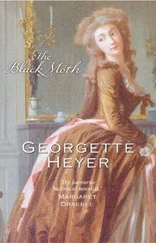April Lady - Georgette Heyer
Здесь есть возможность читать онлайн «April Lady - Georgette Heyer» весь текст электронной книги совершенно бесплатно (целиком полную версию без сокращений). В некоторых случаях можно слушать аудио, скачать через торрент в формате fb2 и присутствует краткое содержание. Жанр: Книги. Описание произведения, (предисловие) а так же отзывы посетителей доступны на портале библиотеки ЛибКат.
- Название:Georgette Heyer
- Автор:
- Жанр:
- Год:неизвестен
- ISBN:нет данных
- Рейтинг книги:3 / 5. Голосов: 2
-
Избранное:Добавить в избранное
- Отзывы:
-
Ваша оценка:
- 60
- 1
- 2
- 3
- 4
- 5
Georgette Heyer: краткое содержание, описание и аннотация
Предлагаем к чтению аннотацию, описание, краткое содержание или предисловие (зависит от того, что написал сам автор книги «Georgette Heyer»). Если вы не нашли необходимую информацию о книге — напишите в комментариях, мы постараемся отыскать её.
Georgette Heyer — читать онлайн бесплатно полную книгу (весь текст) целиком
Ниже представлен текст книги, разбитый по страницам. Система сохранения места последней прочитанной страницы, позволяет с удобством читать онлайн бесплатно книгу «Georgette Heyer», без необходимости каждый раз заново искать на чём Вы остановились. Поставьте закладку, и сможете в любой момент перейти на страницу, на которой закончили чтение.
Интервал:
Закладка:
It might have been thought that a club where the minimum stake was double the sum fixed at any other gaming establishment, and the play was known to be tremendous, was scarcely the place for a young blood, living on an inadequate allowance and a grossly encumbered expectation. The Viscount's well-wishers shook their heads over it, but they could scarcely blame him for playing there, since he had become a member of the club under the auspices of his own father. In general an indifferent parent, Lord Pevensey every now and then awoke to a sense of his responsibilities. Finding that his heir, after an adventurous period at Oxford, had established himself in London and was about to make his debut in fashionable circles, he had felt that it behoved him to do what lay within his power to launch him into society. He introduced him to White's and to Watier's; franked him into the subscription-room at Tattersall's; pointed out to him certain individuals whose business in life it was to diddle the dupes; recommended him to let none but Weston make his coats; advised him to purchase his hats at Baxter's, and to have his boots made by Hoby; and warned him of the dangers of offering a carte blanche to too highflying an Incognita. He was obliging enough to instruct his son in some of the signs by which he might recognize, amongst the muslin company, those prime articles who might be depended on to ease a protector of all his available blunt; and to counsel him strongly not to visit any but the highest class Academies. After that, and feeling that he had left nothing undone to ensure for the Viscount a prosperous career, he cast off his parental responsibilities, which had by that time begun to bore him very much, and left his son to his own devices.
Watier's, which was situated on the corner of Bolton Street and Piccadilly, in an unpretentious house which had once been a gaming establishment of quite a different order, was generally supposed to owe its existence to the Prince Regent. Watier had been one of his cooks, but the Prince, upon learning from some of his friends that a good dinner was not to be had at any of the London clubs, had conceived the benevolent notion of providing gentlemen of high ton with a dining-club not just in the common style, and had suggested to Watier that he was the very man to carry out this pleasing design. The idea took; in partnership with two other of the royal servants Mr. Watier embarked on the venture, and prospered so well that within a very few years he was able to retire from active participation in the business of running the club. By that time what had begun as a dining-club, with excellent cooking, carefully chosen wines, and harmonic assemblies as its attractions, had blossomed into the most exclusive as well as the most ruinous of all London's gaming clubs. The dinners, under the surveillance of Mr. Augustus Labourie, continued to be the best that could be had in town; it had a bank of ten thousand pounds; Mr. Brummell was its perpetual president; and to be admitted to membership was the object of every aspirant to fashion. Play began at nine o'clock, and continued all night, the principal games being hazard, and macao: a form of vingt-un introduced into England by the émigrés from France, and still enjoying a considerable vogue.
The Viscount, after an evening devoted to faro, had not found that this alteration in his habits answered as well as he had hoped it might; and when he rose from a very convivial dinner he resisted all attempts to lure him into the macao-room. He would give the bones another chance, he said, for he had a strong presentiment that fortune was at last about to favour him. So, indeed, it seemed. Being set twenty pounds, and naming seven as the main, he threw eleven, nicking it, which promised well for the night's session. Even Mr. Fancot, who had been trying to lose money to him for months and had begun to despair of achieving his ambition, felt hopeful.
From the circumstance of the Prince Regent's holding one of his bachelor parties at Carlton House that evening, the club was rather thin of company. Mr. Hethersett, strolling in at midnight, found the macao-room deserted by all but a collection of persons who figured in his estimation either as prosy old stagers or tippies on the strut. He took a look-in at those intent on hazard, but here again the company failed to attract him, and he was just about to leave the premises when he was suddenly smitten by an idea. It was not a very welcome idea, nor did he look forward with the least degree of pleasure to the putting of it into action, but it was the best that had occurred to him during the course of a day largely devoted to wrestling with the problem of Lady Cardross's financial difficulties.
The more he considered this matter the greater had grown his uneasiness, for the mild tendre he felt for Nell did not lead him to place any very firm trust in her promise to keep away from usurers. A just man, he was obliged to own that if she dared not confess her debts to Cardross no other solution than to borrow upon interest suggested itself. In his opinion, she was magnifying Cardross's wrath rather absurdly. It was unlikely that he would hear the confession with complaisance, but he was not only a man very much in love; he was also a man of generous temper, and a good deal more than common sense. No one would be quicker to make allowance for youth and inexperience; and although there could be little doubt that he had forbidden Nell to keep her brother in funds Mr. Hethersett had still less doubt that he would understand, and even sympathize with, the very natural feelings which had led her to disobey him. He would know how to put a stop to such practices, too; and that was something that ought to be done immediately, if Nell was not to founder at the last in a morass of debt and deception. Cardross would pardon her now with no loss of tenderness, but if he discovered in the future that she had been playing an undergame with him, perhaps for years, the very openness of his disposition would cause him to regard her with revulsion.
Mr. Hethersett, gloomily pondering, had reached the conclusion that although it would be of some advantage if his cousin were to be put in possession of the facts by almost any agency, the only happy outcome to the affair would be for Nell herself to make the disclosure. But when he had urged her to do so she had recoiled from the suggestion, and had begged him in considerable agitation not to betray her to Cardross. The suspicion had crossed his mind that all might not be so well with that marriage as appeared on the surface. Thinking it over, it occurred to him that the couple were not as often in company together as might have been expected. It was not, of course, in good ton for a man to live in his wife's pocket; but the cynicism which had prompted the higher ranks of the previous generation to regard marriage as a means of advancement or convenience was going out of fashion. Amongst his father's contemporaries, Mr. Hethersett knew of more than one man who could never be sure how many of his lady's offspring had been fathered by himself; while the number of middle-aged couples of the first stare who never willingly spent as much as half an hour together was past counting. But that sort of thing was going out of fashion. Love-matches were being indulged in by persons of consequence; and public signs of affection, instead of being thought intolerably bourgeois, were even smiled on. Mr. Hethersett, whose fastidiousness had lately been offended by the sight of a newly-married pair seated side by side on a small sofa with their heads together at an evening party, was inclined to think that the pendulum was swinging too far, and he certainly did not expect Cardross to behave with such a want of breeding. At the same time, he did sometimes wonder that Nell, married to a man who had not only chosen her, for love, from amongst a dozen more eligible ladies, but was also possessed of a charm which made him generally fascinating to females, should so frequently appear in public either unescorted, or with some quite inferior gallant at her side. There was nothing to take exception to in that, of course; and never anything in her manner towards her admirers to encourage the most inveterate seekers after crim. cons to suspect her of having formed a guilty attachment. Mr. Hethersett was pretty well persuaded that she had no eyes for any man but Cardross: he had seen them light up when his cousin had unexpectedly entered a room where she was sitting. No: he did not think that if anything had gone amiss with the marriage it arose from any lack of affection. He recollected having heard it said that in love-matches even more than marriages of convenience the first year was often one of tiffs and misunderstandings, and decided that so much profound cogitation was leading him to refine too much upon the couple's public conduct. But if there had been disagreements, Mr. Hethersett, knowing just how formidable his cousin could be when he was angered, could readily understand the reluctance of his very young bride to confide her sins to him. It would be useless to press her to do so, he thought; but having reached this conclusion he found himself at a stand, for there was no one other than herself who could tell Cardross of the fix she was in without setting up his back.
Читать дальшеИнтервал:
Закладка:
Похожие книги на «Georgette Heyer»
Представляем Вашему вниманию похожие книги на «Georgette Heyer» списком для выбора. Мы отобрали схожую по названию и смыслу литературу в надежде предоставить читателям больше вариантов отыскать новые, интересные, ещё непрочитанные произведения.
Обсуждение, отзывы о книге «Georgette Heyer» и просто собственные мнения читателей. Оставьте ваши комментарии, напишите, что Вы думаете о произведении, его смысле или главных героях. Укажите что конкретно понравилось, а что нет, и почему Вы так считаете.












